#bloodchild
Text
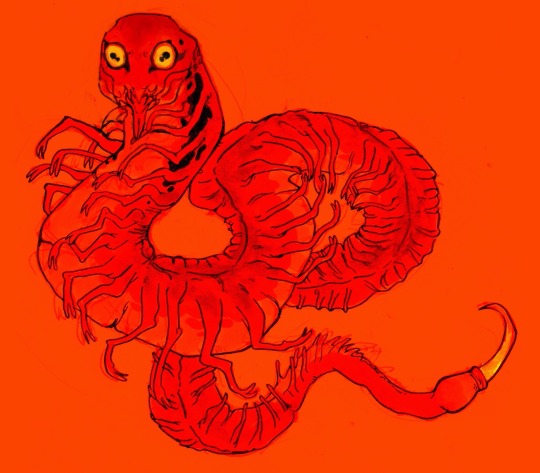
I looked into the yellow eyes, wondering how much I saw and understood there, and how much I only imagined.
547 notes
·
View notes
Text
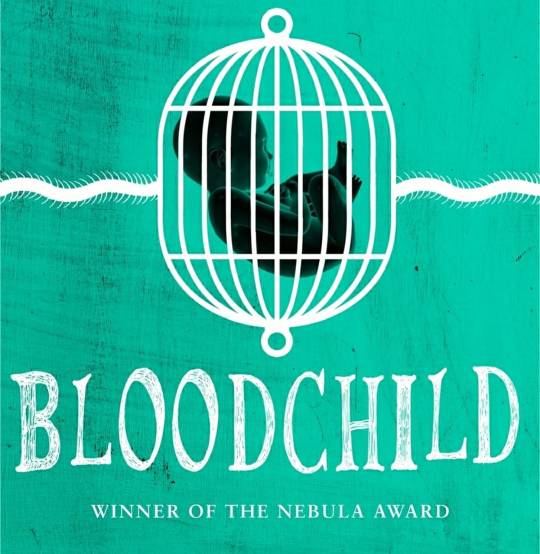
"Bloodchild" by Octavia E. Butler is available to read here
#short stories#short story#bloodchild#octavia butler#octavia e butler#american literature#african american literature#black literature#20th century literature#english language literature#have you read this short fiction?#book polls#completed polls#links to text
26 notes
·
View notes
Text
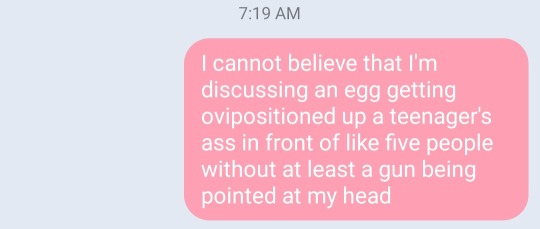
i have a presentation due at 11. when you tell kids to stay in school this is what you are subjecting them to btw
#for important context. im presenting on octavia butler's bloodchild. thee work of mpreg some argue#i also have pulled an all nighter about it#one of my slides is just called The Pregnant Man#notnow#bloodchild#octavia butler#books#< for my own reference. in case i for whatever fucking reason ever want to look fondly at this experience
13 notes
·
View notes
Text
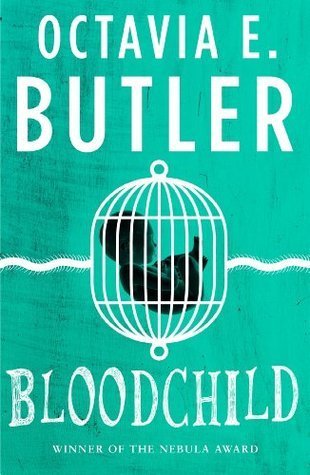
vote YES if you have finished the entire book.
vote NO if you have not finished the entire book.
NOTE: this refers to a standalone ebook edition of the story “Bloodchild”, not to the short fiction collection Bloodchild and Other Stories. if you have read “Bloodchild” in any form, vote YES.
(faq · submit a book)
5 notes
·
View notes
Text

A drawn interpretation of T'Gatoi and Gan from Bloodchild found on Twitter. Easily the most interesting, intimate, and horrifying image I have seen this year.
See the tweet here: https://twitter.com/pinpoms/status/844924502521843712
49 notes
·
View notes
Text
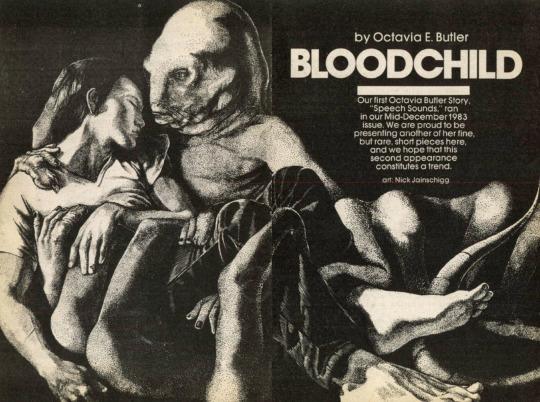
If this is what I'd have to reproduce with in order to retain humanity than humans will simply have to perish.
-Jaymison Tillery
12 notes
·
View notes
Text
I hadn’t realized until now that my post on Octavia Butler’s Bloodchild saved as a draft instead of posting so I’ll just post it now. :)
After reading Bloodchild, by Octavia Butler, I have a lot of thoughts on it.
I think people really tend to downplay the risks and horrors of pregnancy and part of that (or maybe all of it) is because we tend to downplay and disregard what women suffer through, especially physical pain. So to me, the point of Bloodchild (the short story) is to decontextualize pregnancy from women and apply it to men so that it is easier for everyone to understand the dangers, pain, and horror of pregnancy.
After hearing about how some people talk about pregnancy on the internet I can kind of guess at some criticisms that people would have about this idea. I assume at least a few people would think something along the lines of “but it’s not fair to compare aliens impregnating men to human pregnancy. alien pregnancy would be much worse!” And what this story really made me think of is that when women are dehumanized and thought of as less than human, human men become aliens to us. I think there is less of a difference than people would think.
In addition, I think it’s an important story for pro-lifers to read. I’ve noticed that a really big part of the pro-life movement is about disregarding and downplaying the reality of a pregnancy. I’ve also read a post somewhere that said something along the lines of “if you want to understand how bad something is, act like it’s happening to a man and see how bad it is then” and the point of that is that because we so often downplay the things that happen to women, acting like it’s happening to a man allows people to see this scenario without disregarding or downplaying anything. By combining these two ideas I believe reading this short story would be something really helpful in stopping some pro-lifers from dismissing the enormity of a pregnancy and understanding the reality of what they are trying to force onto people.
I think this is an important story for everyone to read, not just men or pro-lifers, because it allows us to have a greater understanding of what actually happens during a pregnancy and childbirth. I really enjoyed reading this story (even though it was kind of gross lol) and I’m really looking forward to reading the rest of her novel!
16 notes
·
View notes
Text
parable of the sower, by octavia butler: three and a half out of five apocalypses
i love octavia butler's short stories, especially the should-be classic bloodchild. of her novels, i have read only three, two of which are the two parable books. parable of the talents, the second, is my favorite.
in parable of the sower, in a setting that was near-future when it was written (the far-off year of 2025), the society of the united states is collapsing due to climate change, debasement of the currency, a wave of a new type of drugs, and climate change. the country is falling apart and a troubling neoconservative faction is ascending in the government. so a total fantasy. by the way, she wrote this in 1993.
i wanted to teach this book to my high school juniors in our american literature class. the main character is about their age. i eventually decided against it because there is content related to sexual violence that you can't skip without skipping the introduction of two main ensemble cast members. still, it's a relevant book for people of any age.
i guess the main thrust of the book is a "scare you straight" program. if i had to interpret it and divine butler's intention without having looked for any statements from her on the matter, i would guess that she's saying, "this is what's at stake here. this is what we stand to lose." i think the other thing she was trying to accomplish was to create a manual for how to prepare for and think during a disaster of national proportions.
an engaging book, with some practical advice for surviving the apocalypse, just in case we don't heed the warnings. if you want to read the series in order, this is a gateway to parable of the talents, a book that i liked even more -- mostly because it upgrades from "small band of survivors travel guide" to "community establishment and defense guide". i *love* that stuff.
#octavia butler#parable of the sower#parable of the talents#sf#scifi#science fiction#dystopian fiction#dystopia#review#reviews#book reviews#book review#octavia e. butler#bloodchild
7 notes
·
View notes
Text

Title: Bloodchild | Author: Anna Stephens | Publisher: Talos (2019)
2 notes
·
View notes
Photo

My Juneteenth celebration! I ordered these books from Harriett’s Bookshop to support Black women writers and businesses and to keep learning!
20 notes
·
View notes
Text
In class, we read the excerpt “Bloodchild” by Octavia Butler. It was a sci-fi story about Tilc (alien) creatures that were pregnant humans. The Tilc runs the world that humans live in. It would be hard for them to rebel against them. This story was very interesting because of how they had the Tilc babies. The men are the ones that will carry the babies. Also, there was a family that was good friends with the Tilc. She wanted to lay her eggs in the son so she can have her children. It’s really a cycle for the Tilc because they live longer than humans. If their human dies they find a new one. I feel like some of the Tilc care about their humans but they can’t because they just need someone to lay eggs in. Some say that it relates to slavery and I can understand how it can relate to it. The humans weren’t free and the Tilc had control over the planet. Some humans would die when the baby Tilc would hatch inside them. Bloodchild was something new to me because I wouldn’t have thought of a book like this. It was good to see a black author write something different.
2 notes
·
View notes
Text
some of you need to read bloodchild. not a radfem text or anything. I just need more people to talk about it with 😭
2 notes
·
View notes
Photo

also, this is what i think a tlic looks like
like...humanoid/leonine combined face with ridiculously human lips, small, thin but quick legs, broad doglike ribcage, and of course, a whiplike scorpion’s tail with a stinger on the back
i don’t know if this lines up with what we see in the short story, but i’ve always imagined ever since reading bloodchild for the first time in like 2018 or so that a tlic would look like this
3 notes
·
View notes
Text
"It is basically a love story. There are many different kinds of love in it: family love, physical love . . . The alien needs the boy for procreation, and she makes it easier on him by showing him affection and earning his in return. After all, she is going to have her children with him." (Butler, 1996)
Taken from an interview with Stephen W. Potts in 1996
14 notes
·
View notes
Text

Lesson #106
“First, forget inspiration. Habit is more dependable. Habit will sustain you whether you're inspired or not. Habit will help you finish and polish your stories. Inspiration won't. Habit is persistence in practice.”
As a literary genre science fiction challenges us to view humanity through a unique lens; in the context of speculation grounded in scientific plausibility. The best of these works have as their central premise the age-old questions of "Why are we here? What is our purpose? What makes us human?" The amazing body of work produced by author Octavia Butler addresses all of these in a whirlwind of imaginative storytelling, boundless curiosity, and vividly-depicted realities.
Born in 1947 California, Octavia E. "Junie" Butler was raised by her mother and grandmother and buried herself in books due to childhood struggles with dyslexia. Years later she would tell friends that she got into writing at the age of 10, having seen a truly atrocious B-movie titled "Devil Girl from Mars" and asserted that she could write a better story than that. After graduating from Pasadena State College in 1968, Butler fell into a habit of writing every morning at 2:00am. In 1976 her first short story, "Patternmaster," was published, the starting point (though narratively the endpoint) of what would become her highly-regarded Patternist series. In 1979 she published Kindred, a time-travel story about slavery in the United States, that remains her most popular work.
Over the years Butler received numerous literary accolades including a Macarthur Fellowship (the first such science fiction author to do so), and acquired two Hugos and two Nebulas; the former for her gripping Xenogenesis trilogy (Dawn, Adulthood Rites, and Imago); and the latter for her two-part Earthseed series (Parable of the Sower and Parable of the Talents). Xenogenesis explores posthumanist themes of power imbalance and gender fluidity, as the last survivors of humanity must cope with their enslavement by an alien species, the Oankali. The Earthseed series posits life in a post-apocalyptic near-future Earth that ultimately gives rise to a religion rooted in symbiogenesis; teaching that because God is Change, humanity may "shape God."
Butler died very suddenly of a stroke in 2006. In 2019 her alma mater, Pasadena City College, established the Octavia E. Butler Memorial Scholarship. In 2021 the landing site of the Perseverance Rover on Mars, was christened "Octavia E. Butler Landing." A mountain on Pluto's moon Charon also bears her name; and Asteroid 7052 was renamed Octaviabutler by its discoverer, astronomer Eleanor Helin.
Lesson #106
#octaviabutler#posthumanism#symbiogenesis#bloodchild#earthseed#blacklivesmatter#teachtruth#dothework
2 notes
·
View notes
Photo

オクテイヴィア・E・バトラー、藤井光訳『血を分けた子ども』(河出書房新社)装幀:川名潤
同著者の『キンドレッド』がよかったので買いました。
#books#Japanese books#SF#sci-fi#Octavia E Butler#オクテイヴィア・E・バトラー#血を分けた子ども#河出書房新社#川名潤#藤井光#書影#装幀#装丁#book design#bloodchild
4 notes
·
View notes